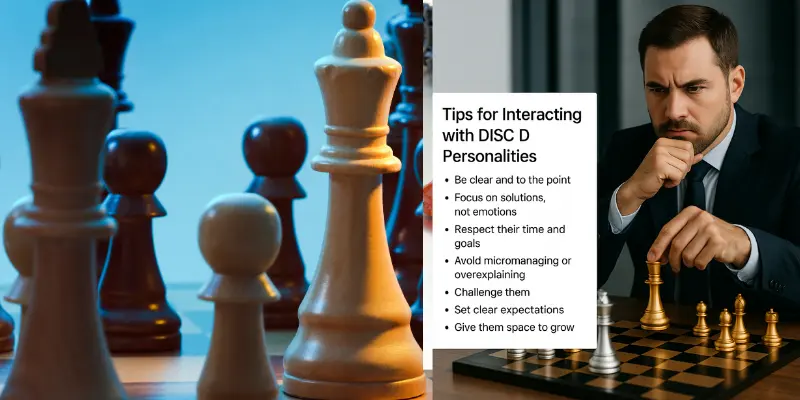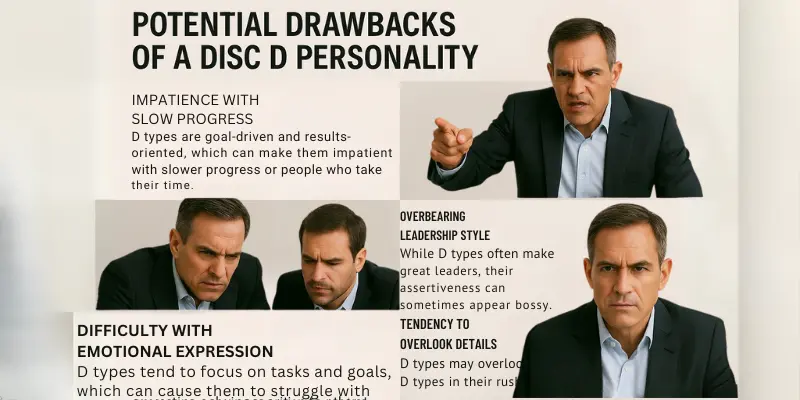What is Disc D Personality? Understanding the Dominant Trait in DISC Theory
Published: 27 Dec 2025
Do you ever wonder why some people naturally take charge in any situation, like captains steering their ships through storms? That’s often the key quality of a DISC D personality: confident, bold, and goal-driven. In DISC theory, this personality type is known for its dominance and fast decision-making style, making it a key player in leadership and high-pressure roles.

I’m Tanveer, a self-development writer with years of hands-on experience exploring human behaviour and personality types. In this article, I’ll explain what a DISC D personality means, including its traits, strengths, challenges, and real-life examples.
By the end, you’ll clearly understand how to spot D types, interact with them, or recognize those traits in yourself. So, if you’re ready to discover the inner engine of high performers, let’s dive in!
What Is DISC D Personality?
The DISC D personality, representing Dominance in the DISC model, is often seen as a natural-born leader. People with this personality type are assertive, goal-oriented, and thrive on challenges. Driven by results and efficiency, D types are focused on making quick decisions and achieving their objectives, often in fast-paced environments.
A leader is one who knows the way, goes the way, and shows the way.John C. Maxwell
The D Type Personality, standing for Dominance, is like the engine of a high-speed train: focused, fast, and always pushing forward. People with this type prefer action over analysis. They love challenges, set big goals, and don’t shy away from taking control of situations. In DISC terms, they are task-oriented, direct, and decisive.
Overview of DISC Personality Theory
In the 1920s, psychologist William Moulton Marston introduced a simple yet powerful way to understand human behavior, the DISC Personality Theory. It breaks personalities into four main types: dominance (D), Influence (I), Steadiness (S), and Conscientiousness (C). Each type reflects how people respond to challenges, rules, and others around them.
From my coaching experience, I’ve seen D types shine in roles that demand quick thinking and leadership. One of my past clients, Sara, turned her side hustle into a business empire simply because she refused to wait—her dominant personality led her to act while others hesitated.

Key Traits of a DISC D Personality
D-type personalities are known for their dominant traits; they stand out as assertive, confident, and highly driven. These individuals often take charge in challenging situations and push forward toward their goals, even when others hesitate. Think of them as the captains of a ship, steering it through rough waters with confidence and speed.
Core Characteristics
- Confident and assertive: D types are not afraid to speak their mind and make decisions. They have a strong presence that commands attention.
- Risk-takers and decision-makers: Comfortable with uncertainty, they embrace challenges and make quick decisions.
- Strong-willed and independent, D types trust their abilities and prefer to work alone, believing they can achieve their goals with minimal guidance.
- Highly competitive: Their drive to succeed often leads them to compete with themselves and others, as they strive for excellence.
The successful warrior is the average man, with laser-like focus.Bruce Lee
| Strengths |
|---|
|
| Possible Weaknesses |
|---|
|
How D-Type Personality Behaves in Daily Life
D Type personalities are known for their boldness, decisiveness, and goal-driven nature. Whether at work or in personal relationships, their behaviour is rooted in their desire for results and efficiency.
Leadership is the capacity to translate vision into reality.Warren Bennis
Let’s take a closer look at how these traits show up in different areas of life.
1. In the Workplace
- Often seek leadership roles: D types are drawn to leadership roles where they can make decisions and deliver outcomes. Managers and entrepreneurs succeed in leadership roles.
- They prefer direct communication, valuing clear and straightforward communication. You’ll often find them cutting to the chase and avoiding unnecessary details.
- Thrive in challenges and fast-paced environments: D types love environments that require quick thinking and decision-making. Challenges energize them, and they always look for ways to improve processes and achieve goals faster.
2. In Relationships
- Value honesty and directness: D types appreciate openness and straightforwardness in their relationships. They prefer discussing issues directly rather than letting things linger.
- May struggle with emotional expression: They tend to focus on facts and actions rather than emotions, which can sometimes make them seem distant or unemotional in personal settings.
- Need partners who respect independence: D types value their freedom and need partners who understand their need for space and independence. They thrive in relationships where mutual respect is a key component.
Tips for Interacting with DISC D Personalities
Interacting with a D-type personality is like playing chess; every move is calculated, and efficiency is key. Just as a skilled player focuses on the endgame, D types prioritize results, directness, and clear goals.
With this in mind, the following tips will help you navigate their driven nature and work harmoniously together.
- Be clear and to the point: D types don’t have time for fluff. When communicating with them, be direct and concise, focusing on the essentials.
- Focus on solutions, not emotions: When discussing problems, D types prefer to hear about solutions rather than dwelling on emotions or past issues.
- Respect their time and goals: D types are highly goal-oriented, so be mindful of their time. Show that you respect their objectives and understand their urgency.
- Avoid micromanaging or overexplaining: D types value their independence and can become frustrated if they feel controlled or are given excessive details. Let them take the lead.
- Don’t take their directness personally: D types are often straightforward, but it’s not meant to be harsh. Recognize that their focus is on getting things done quickly.
- Challenge them: D types enjoy a good challenge. Presenting them with new and exciting problems to solve will engage their competitive nature and inspire them to perform their best.
- Set clear expectations: D types prefer knowing exactly what is expected of them. Be clear about deadlines and outcomes to help them stay on track and avoid frustration.
- Give them space to grow: D types are constantly striving for improvement. Support their drive for growth and development by providing opportunities for advancement or new responsibilities.

Can You Be a D Type and Still Be Empathetic?
Many people believe that D types, with their direct and dominant nature, may lack empathy. However, that’s not the case! Just like a strong leader can guide a team with authority and care, a D-type can develop empathy by honing emotional intelligence and self-awareness. It’s all about finding balance and adapting to the needs of others while staying true to their goals and assertiveness.
Yes, D types can develop emotional intelligence.
- Though naturally more task-focused, D types can learn to tune into the emotions of those around them.
- Through intentional effort, they can become more empathetic and responsive in their interactions.
A growth mindset helps them strike a balance between assertiveness and empathy.
- A growth mindset enables D types to evolve and see the value in connecting emotionally with others.
- By embracing learning opportunities, they can enhance both their leadership skills and their capacity to demonstrate empathy.
Self-awareness is key in personal and professional settings.
- D types who practice self-awareness can navigate their assertiveness and empathy in a way that benefits their relationships and success.
- Recognizing when to push and when to listen is essential for building strong, positive connections.

How to Identify a D Type Personality in Yourself or Others
Ever find yourself naturally taking charge of situations, eager to make decisions, and focused on results? Do tight deadlines energize you rather than overwhelm you? If these traits sound familiar, you might be a D type!
1. Ask Yourself These Questions:
Do you enjoy taking charge?
- D types often step up when there’s a need for leadership. If you’re the first to take the reins in a group setting, that’s a strong sign.
Do deadlines excite you rather than stress you out?
- A D-type thrives under pressure and is motivated by the urgency of deadlines. They see challenges as opportunities to prove their efficiency and capabilities.
Are you goal-oriented and task-driven?
- If you find yourself always focused on achieving the next goal and moving quickly toward results, it’s another indicator of a D-type personality.
Do you prefer direct and clear communication?
- D types value straightforward, no-nonsense communication. If you tend to get frustrated by vague or indirect conversations, it reflects your D-type tendencies.
2. Take the DISC Test
If you’re curious to know for sure whether you fit the D-type personality, consider taking the DISC Personality Assessment. This scientifically backed test can reveal your personality traits, strengths, and weaknesses.
- D Types Are High-Energy Decision-Makers: While others may deliberate over decisions, D types make them quickly and confidently. Their ability to make fast, high-stakes choices is not just natural—it’s a strategic advantage they rely on to keep things moving and avoid unnecessary delays.
- They Often Have a “Win at All Costs” Mentality: D types are so goal-oriented that they might approach challenges with a “win at all costs” mentality. Whether in business, sports, or personal projects, they push themselves and their teams to succeed—even if that means taking risks or making tough calls along the way.
- DISC D Are Often Silent Motivators: D types are not always the loudest in the room, but their actions speak volumes. They motivate through results, pushing teams forward by setting clear goals and expectations. Their quiet determination often influences others more than words ever could, creating a strong, action-oriented environment.
Potential drawbacks of a DISC D personality
Impatience with Slow Progress: D types are goal-driven and results-oriented, which can make them impatient with slower progress or people who take their time. It can lead to frustration or even pushing others too hard, potentially creating tension within the team.
Overbearing Leadership Style: While D types often make great leaders, their assertiveness can sometimes appear bossy. Their desire to take charge may unintentionally overwhelm others, causing them to feel micromanaged or undervalued.
Difficulty with Emotional Expression: D types tend to focus on tasks and goals, which can cause them to struggle with expressing or being sensitive to others’ feelings. It can make them seem cold or unapproachable, especially in personal relationships.
Tendency to Overlook Details: D types may overlook important details or skip over thorough analysis in their rush to achieve goals. It can result in mistakes or missed opportunities, especially when precision and attention to detail are critical.

Final Verdict
Understanding what DISC D personality is about involves identifying traits and using those traits to grow in both personal and professional settings. The DISC theory, developed by psychologist William Moulton Marston, provides a scientifically grounded framework for understanding the dominance, influence, steadiness, and conscientiousness within each individual.
I encourage exploring this theory after experiencing the power of understanding these features.
Are you curious to learn more? Take the DISC test today to gain a deeper understanding of your unique strengths and areas for improvement.
FAQs About DISC D Personality
Understanding the DISC D personality often sparks curiosity. Here are some common questions readers may have after exploring this topic.
DISC D personality refers to the Dominance type in the DISC model. These individuals are confident, goal-focused, and prefer action over discussion. They thrive in fast-paced environments and love taking charge.
Yes, being a D-type comes with strengths such as leadership, quick decision-making, and strong willpower. However, balancing it with empathy makes it even better. Like all personalities, it’s about self-awareness and growth.
Not necessarily. While D types can appear assertive or intense, this doesn’t mean they are aggressive. With emotional intelligence, D types can be both powerful and respectful.
While most D types are extroverted, some may show dominant traits quietly. It’s more about behaviour in situations than being outgoing. Even introverts can be highly decisive and results-driven.
You might be a D type if you enjoy leading, making quick decisions, and dislike delays. Taking a DISC assessment can give you a clearer picture. Self-reflection on how you handle tasks and people also helps.
Absolutely! D types can develop empathy, active listening, and better interpersonal skills with practice. Emotional growth further enhances their leadership.
D types shine in roles that require leadership, risk-taking, and fast action, like entrepreneurs, executives, or project managers. They do best in positions where they can make bold moves and drive results.
They often confront stress with action and control, trying to fix problems quickly. However, under pressure, they might become impatient or controlling. Managing stress through awareness and balance is key.
They may sometimes seem too controlling or insensitive. Impatience and a tendency to overlook emotions are common, but these can be managed with conscious effort and feedback.
Your core traits usually stay consistent, but you can adapt and grow over time. Life experiences, awareness, and learning can help you adjust your behaviour. It’s about evolving, not changing who you are.
If this helped you even 1%, smile – it means everything.
(No email needed. No follow required. Just smile.)

- Be Respectful
- Stay Relevant
- Stay Positive
- True Feedback
- Encourage Discussion
- Avoid Spamming
- No Fake News
- Don't Copy-Paste
- No Personal Attacks

- Be Respectful
- Stay Relevant
- Stay Positive
- True Feedback
- Encourage Discussion
- Avoid Spamming
- No Fake News
- Don't Copy-Paste
- No Personal Attacks





